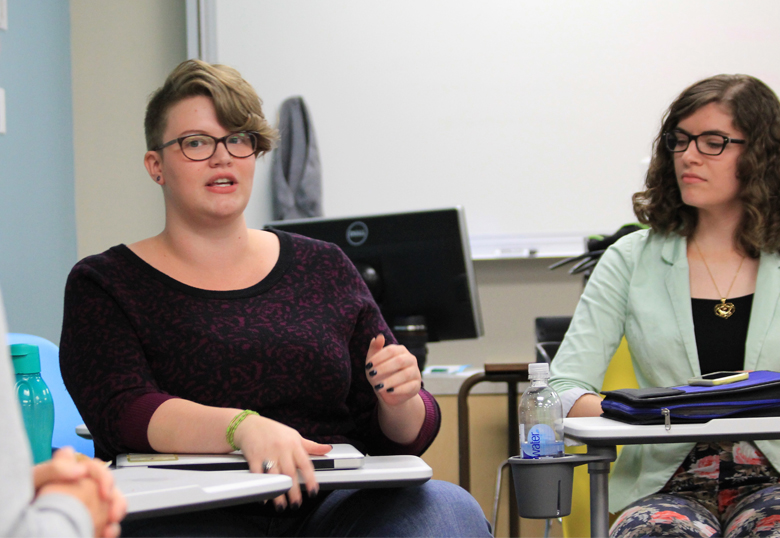The new Global Citizenship Cohort at the University of Lethbridge gives students an opportunity to learn about the world while fostering their desire to make a positive difference.
In high school, Taylor Myndio learned about resource depletion and the oppression of people around the globe. That sparked an interest in environmental and social issues and she felt pulled to action. When she registered at the U of L and heard about the Global Citizenship Cohort, she didn’t hesitate to sign up.
Myndio is one of 16 students in the cohort who take a series of five courses together centred on the themes of water, sustainability and social justice.
“I really do like how the professors show you the connections between courses,” says Myndio, a first-year biology major. “I’m enjoying my classes and I wouldn’t have thought about taking them before because I was coming here mostly for science.”

This fall, the group has an anthropology class, a liberal education course and a geography course in common. Next semester, they’ll take a history course and another liberal education class together.
“One of the biggest highlights has been the social aspect. I really enjoy that I am consistently seeing the same people and I know I can rely on those people,” says Jamie Lewis, a first-year student majoring in anthropology.
Lewis is considering diplomacy or international development as a career and she signed up for the Global Citizenship Cohort because of the added credential she’ll receive. Students in the cohort will earn a certificate upon completion.
Dr. Craig Cooper, dean of Arts and Science, spearheaded the Global Citizenship program. A major benefit is that students take courses together, giving them a built-in community, says Dr. Shelly Wismath, program co-ordinator and a U of L professor in the Liberal Education Program and the Department of Mathematics and Computer Science.
“There’s a lot of literature that shows that students often have a hard transition from high school to university and often where people fall through the cracks is through loneliness or not getting connected quickly with the place or the people,” she says.
The students are all in their first year of university and come from a variety of disciplines. The program has been designed so that students receive mentoring from their professors and also learn what resources are available to them. The nature of the program has drawn a group of like-minded students who are interested in the big picture and have a desire to make the world a better place.
“They’re an amazing group of students,” says Wismath. “I’m so impressed with them; they’re very keen, they’re very strong and they’re already really engaged in global citizenship.”
Moved by the plight of many Syrian people, a group of five students is planning to raise funds for the U of L Refugee Action Committee, a volunteer group formed to help resettle a Syrian family in Lethbridge.
“At the beginning of the semester, I had a moment where I was feeling really overwhelmed by the humanitarian crises happening all over the world. It was really bothering me and I wanted to figure out what to do about it,” says Lewis.
She reached out to Wismath and the idea of raising funds to help refugees from Syria began to form.
“For us, it was a really practical decision. It’s something we can contribute to directly and we know exactly where our money is going,” says Lewis.
The Global Citizenship Cohort is expected to grow in the future. Wismath says she would like to see 40 to 50 students registered, as that would allow students in the cohort to have their own classes.
